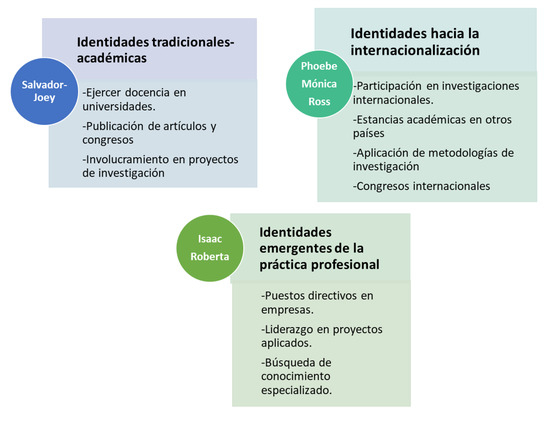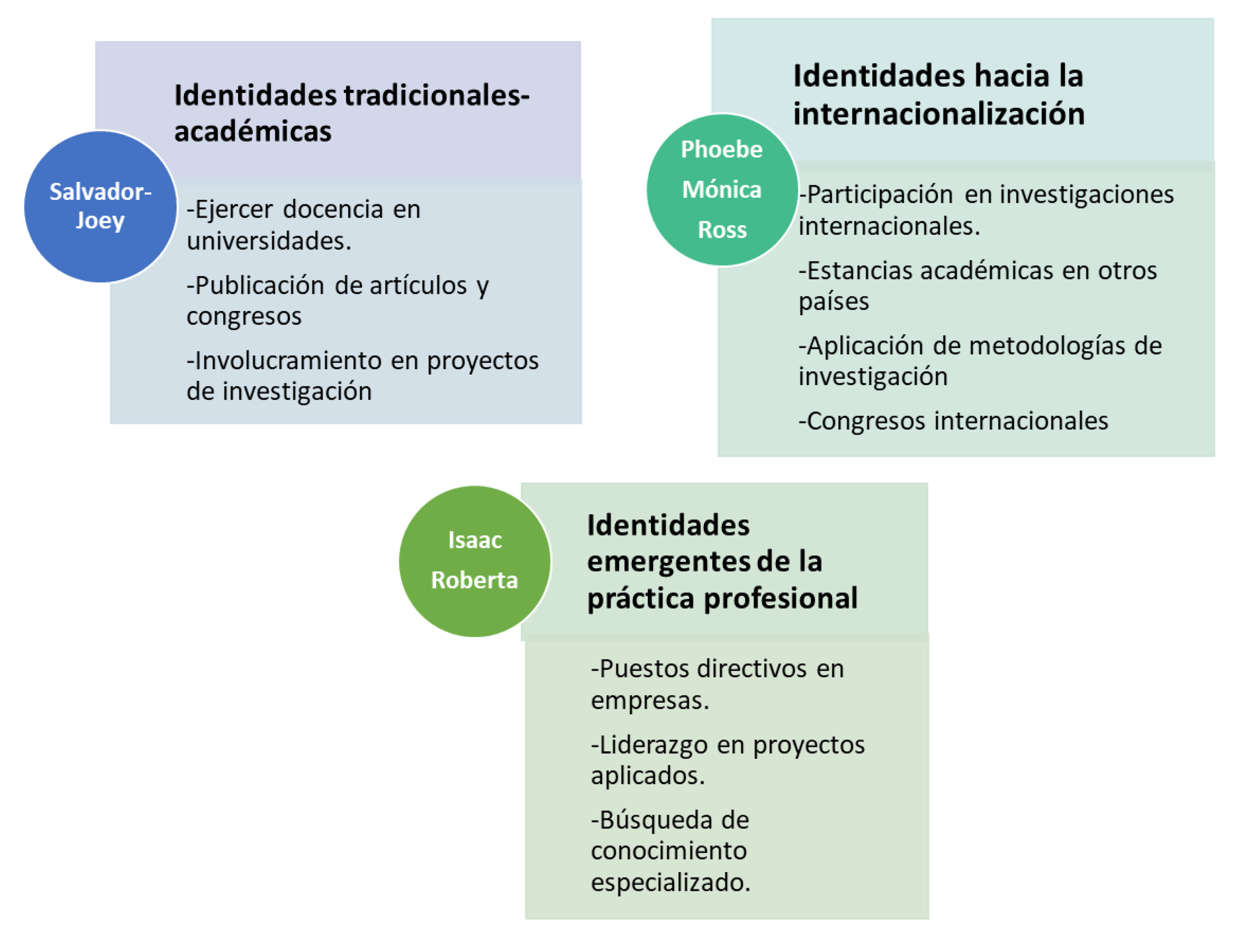Abstract
The present investigation focuses on understanding the experiences of professional training and identities that face-to-face and virtual doctoral students construct in a training program as educational researchers in Mexico. The relationship between experiences and emerging identities as researchers, academics and learners has not been an important focus in research on doctoral students. Similarly, virtual doctoral programs are scarcely offered in Mexico and their impact on the trajectory of doctoral students has been barely documented. The present research is positioned in the qualitative-phenomenological approach and is based on the conceptual referents of the socio-cultural approach to identity in practice. The research questions guiding the analysis were the following: (a) How do the face-to-face and online doctoral students experience their doctoral career? (b) What strengths, opportunities, difficulties and threats do they experience? and (c) What identities do you create in your doctoral career?
1. Introduction
The role of the formation of researchers for a nation is a pillar that sustains the generation of knowledge, development, and innovation in all sectors, its relevance has been pointed out from various policies and educational trends at the international level [1,2]. In an analysis of international statistics on OECD [3] member countries that train researchers and report graduates of doctoral programs from all areas in 2015, the ranking is the following: the United States with 68,923 graduates, followed by Germany with 29,218, the United Kingdom with 26,636, Japan with 15,714 reports, France with 13,774 and Spain with 11,316. In Latin America, Mexico is positioned with 6050 doctoral graduates and Chile with 669 graduates. In the case of Mexico, according to statistics of the Secretariat of Education (SEP) [4] for the 2016–2017 school year at the national level, the enrollment of students studying a postgraduate program (Master’s, Specialty or Doctorate) of both public and private sectors, is 238,872 students, which represent only 0.6% of the total education system.
2. Theoretical Framework
Identity is a construct that has been studied extensively in disciplines such as psychology, anthropology, and sociology. In psychology, classic authors such as Erikson [5], define identity as the result of transit through different stages of development from childhood to adulthood, conforming a solid and stable construct. More recently, Gergen [6] argues that the demands of the postmodern era constitute a basic dilemma for people in shaping their identity. From the standpoint of sociocultural studies, important elements have been contributing to make the social component of identities visible, highlighting the interaction between the social structure and the subjectivity of the individuals, without being disconnected entities and in which historically and spatially localized practices occur [7]. In the same way, this vision of identity gives it a dynamic component and makes it possible to see it as “mobile identities” and in constant reconfiguration in relation to social positioning, that is, individuals positioning themselves subjectively in specific periods of social practice. For example, in a classroom, we can have different positions on the identity of “student”, “professional” or “researcher”.
3. Methodology
The methodological design used in this study was constructed following a phenomenological approach [8] from which a deep understanding of the lived experiences of the participants on a common phenomenon lived by different individuals is realized.
3.1. Participants and Context
The participants of the research were 13 students who attended both an on-campus and a virtual doctoral program on education in Mexico, during the August–December 2017 semester. The students belonged to two different generations. One of them completed his doctoral studies in person, attending seminars and fulfilling academic and research tasks within the facilities of the university. The other group was studying in virtual distance mode, from different states and localities in Mexico, doing academic activities in a virtual platform and in a synchronic way with their respective thesis directors. Four students in face-to-face mode and three students in virtual mode formed the sample selected for this research report [9].
3.2. Ethical Consideration’s
The ethical considerations that were carried out during the entire investigation process were followed according to the guidelines [8]. Informed consent was obtained from all the participants in written and digitized forms. The name of the educational institution, as well as of the participants remains anonymous; it is reported through pseudonyms in the transcripts of interviews and all the documents generated in the final report of the investigation.
4. Results
4.1. A Decision to Study a Doctorate in Education
In this category, we found that the decision to study a Doctorate in Education was not based on the same circumstances for all students. In some cases, the decision was taken from a continuity with the academic trajectory or the projected identity towards the field of teaching and/or research. For example, for Joey, at the time of choosing his doctoral career, he was evaluating what it took to continue training as a teacher-researcher:
Because my personal interest was to continue preparing myself to help the generations through education, I have always believed that education is transformative. I realized how mastery gave me tools, conceptual and methodological practices to also enrich my work as a teacher and as program director. That is why I said that I wanted to continue preparing, to better serve my students, to know how to carry out a much deeper research on the educational field and I felt that in practice I had experience for everything I had already experienced, but I did feel so safe in the research part (Joey, face-to-face student).
4.2. Perception of Face-To-Face Studies vs. On-Line
As discussed in previous sections, the doctoral program analyzed had two types of study: one in person and one virtual. These modalities of studying doctoral studies had different perceptions about the impact and organization of their professional training. For some, the virtual platforms implied a challenge for the realization of their academic objectives, due to the time management involved in selecting resources and uploading them to the platform. For example, Salvador noticed that the time of use of the platform was very long:
(...) I do not have anything against technology, however, this Blackboard can annoy me, from the interface, I feel very rigid all the operative part of that there is the first menu, but you select to open a program and another second menu is opened many times Blackboard failed and suddenly it fell, other times the activity did not know whether to put it in tasks or in assignments. I have invested 10% or 20% of my time in the doctorate in operational logistics... (Salvador, on-line student).
4.3. Challenges, Support Resources and Emotions Experienced in Doctoral Program
In this category, all those moments of the doctoral trajectory that the students experience with a complicated degree of difficulty and with intensified emotions both positive and negative were grouped. At first, for some, it was a time of tension during the selection process to enter the PhD and the first semester studied.
4.4. Identities Displayed during the Doctorate Program
All those codes referring to the identities displayed in the PhD were grouped, understood as the configuration of identities that the students manifested in the past, present or future and to which they made reference in relation to the negotiation or recognition of specific professional communities. For example, Roberta manifests as an important element for the configuration of her identity as an educational researcher the invitation to participate in a recognized Congress within a community of medical specialists.
5. Discussion
Based on the findings documented through this research with a phenomenological approach, we can summarize that the identities displayed by students in their doctoral career tend to be grouped into three categories: (a) traditional-academic identities, (b) identities towards internationalization and (c) Identities emerging from professional practice (see Figure 1). Thus, in the identities grouped as traditional, there is a strong emphasis on teaching in academic-university spaces, as well as academic production (books, articles, papers) as the central objective of these identities. On the other hand, the identities tending toward internationalization are focused on strategies that allow establishing international collaboration networks, through academic stays, financed projects, exchanges or international congresses. Finally, emerging identities of professional practice are oriented towards specialized professional practice in scenarios such as private companies, which may include taking leadership in applied projects, positioning in management positions and designing solutions for the particular problems of the company-business context. The difficulties experienced by the students in the doctoral trajectory were diverse and refer to the different personal moments of life through which they went through, to their work circumstances, and to the approval of certain activities for the membership to the academic community (approval of exams, appointments, publications, recognition, etc.). Regarding the differences in virtual programs vs. face-to-face, in the findings, no differences were identified by the students regarding the appropriation of knowledge and academic training. However, the main difference that they highlight is the closeness and involvement of full time with the community of practice like other colleagues, professors, the physical campus or the mentors of the program, aspect that coincides with the international research [10], and in which close mentoring is highlighted as a necessary strategy for virtual doctoral programs. In this case, virtual students perceive as a positive strategy the use of technological tools for communication with their thesis advisors.

Figure 1.
Grouping of the identities displayed by the doctoral students.
Author Contributions
The first author L.N.R.-R. did most of the work, as principal investigator, directed and applied the research. The second author J.M.F.-C. collaborated constantly throughout the research with theoretical-methodological contributions within the writing.
Acknowledgments
We appreciate the participation of the doctoral students and their willingness to collaborate in the research.
Conflicts of Interest
The authors declare no conflict of interest.
References
- Becker, A.; Cummins, M.; Davis, A.; Freeman, A.; Giesinger, C.; Ananthanarayanan, V. NMC Horizon Report: 2017 Higher Education Edition; The New Media Consortium: Austin, TX, USA, 2017. [Google Scholar]
- OECD. Innovating Education and Educating for Innovation. The Power of Digital Technologies and Skills; OECD Publishing: Paris, France, 2016. [Google Scholar]
- OECD. The Internationalisation of Doctoral and Master’s Studies; OECD: Paris, France, 2016; Volume Education 1. [Google Scholar]
- SEP. Princiaples Cifras Del Sistema Educativo Nacional. México. 2017. Available online: http://fs.planeacion.sep.gob.mx/estadistica_e_indicadores/principales_cifras/principales_cifras_2016_2017_bolsillo.pdf (accessed on 1 January 2018).
- Erikson, E.H. Infancia y Sociedad; Hormé: Buenos Aires, Argentina, 1983. [Google Scholar]
- Gergen, K.J. The Saturated Self: Dilemmas of Identity in Contemporary Life; Basic books: New York, NY, USA, 1991. [Google Scholar]
- Holland, D.; Lave, J. Social Practice Theory and the Historical Production of Persons. Actio Int. J. Hum. Act. Theory 2009, 2, 1–15. [Google Scholar]
- Creswell, J.; Poth, C. Qualitative Inquiry and Research Design. Choosing Among Five Approaches, 4th ed.; Creswell, J., Poth, C., Eds.; SAGE Publications, Inc.: Thousand Oaks, CA, USA, 2018. [Google Scholar]
- Kvale, S. Interviews: An Introduction to Qualitative Research Interviewing; SAGE Publications: Thousand Oaks, CA, USA, 1996. [Google Scholar]
- Kumar, S.; Johnson, M.; Hardemon, T. Dissertations at a Distance: Students’ Perceptions of Online Mentoring in a Doctoral Program Résumé. Int. J. E-Learning Distance Educ. 2013, 27, 1–11. [Google Scholar]
Publisher’s Note: MDPI stays neutral with regard to jurisdictional claims in published maps and institutional affiliations. |
© 2018 by the authors. Licensee MDPI, Basel, Switzerland. This article is an open access article distributed under the terms and conditions of the Creative Commons Attribution (CC BY) license (https://creativecommons.org/licenses/by/4.0/).

